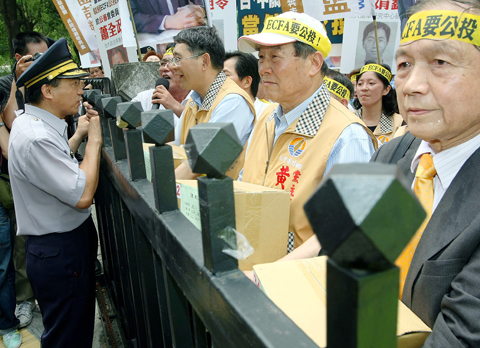The Taiwan Solidarity Union (TSU) is showing no sign of giving up its fight to turn the recently signed cross-strait trade agreement over to a public referendum.
Delivering nearly 100 boxes, each holding more than 1,000 signed petition forms, to the Central Election Commission (CEC) yesterday, TSU officials said the Economic Cooperation Framework Agreement (ECFA) could alter the status quo for Taiwan and lock the country into a “one China” framework.
“Everyone can clearly see that this ECFA will change Taiwan’s economic, social and political relationship with China,” TSU Chairman Huang Kun-huei (黃昆輝) said outside the CEC in Taipei. “President Ma Ying-jeou (馬英九) is unilaterally changing the cross-strait situation, and we want to ask him: Doesn’t this require the people’s approval?”

PHOTO: CNA
This is the second referendum proposal on the controversial agreement raised by the TSU, which wants to ask voters whether they agree with the government’s decision to sign the ECFA with China. The earlier proposal was rejected by the Referendum Review Commission last month after it said the TSU’s referendum question and content contradicted one another.
Flanked by a number of pro-independence organizations, including the Taiwan Association of University Professors and the World United Formosans for Independence, a dozen TSU officials arrived outside the commission, wheeling dozens of brown boxes containing the petition forms.
An apparent misunderstanding initially took place between the TSU officials and police after police officers first closed the outside gates, barring entry to party officials trying to hand their petition forms over to the CEC.
Amid cries from dozens of protesters at the scene, who yelled that a referendum “is a public right,” and “the ECFA needs a referendum,” police opened the outside gate to a small number of TSU officials including Huang, but subsequently tried to close the glass doors to the building.
All of the TSU’s 105,000 petition forms were eventually delivered after CEC officials came out to officially accept the TSU proposal, which prevented tension from boiling over as more than 20 police officers looked on.
Under the Referendum Act (公民投票法), the CEC has 15 days to either accept the proposal and pass it on to the Referendum Review Committee or send it back to the organizers pending corrections of any errors found.
The referendum review committee must then make a decision on whether to give the go-ahead within one month.
If passed, the TSU will have to gather a total of 860,000 petition forms — 5 percent of the voting public in the last presidential election — before the proposal can be put to the ballot box.
Fearing a repeat of last month’s rejection of the more than 110,000 petitions submitted at the time, Huang called on members of the Referendum Review Committee to avoid politicizing the referendum process.
“The committee and the CEC are responsible for aiding the people’s right to a referendum, not blocking it. Committee members should not see the public as the enemy,” Huang said.

A preclearance service to facilitate entry for people traveling to select airports in Japan would be available from Thursday next week to Feb. 25 at Taiwan Taoyuan International Airport, Taoyuan International Airport Corp (TIAC) said on Tuesday. The service was first made available to Taiwanese travelers throughout the winter vacation of 2024 and during the Lunar New Year holiday. In addition to flights to the Japanese cities of Hakodate, Asahikawa, Akita, Sendai, Niigata, Okayama, Takamatsu, Kumamoto and Kagoshima, the service would be available to travelers to Kobe and Oita. The service can be accessed by passengers of 15 flight routes operated by

Alain Robert, known as the "French Spider-Man," praised Alex Honnold as exceptionally well-prepared after the US climber completed a free solo ascent of Taipei 101 yesterday. Robert said Honnold's ascent of the 508m-tall skyscraper in just more than one-and-a-half hours without using safety ropes or equipment was a remarkable achievement. "This is my life," he said in an interview conducted in French, adding that he liked the feeling of being "on the edge of danger." The 63-year-old Frenchman climbed Taipei 101 using ropes in December 2004, taking about four hours to reach the top. On a one-to-10 scale of difficulty, Robert said Taipei 101

MORE FALL: An investigation into one of Xi’s key cronies, part of a broader ‘anti-corruption’ drive, indicates that he might have a deep distrust in the military, an expert said China’s latest military purge underscores systemic risks in its shift from collective leadership to sole rule under Chinese President Xi Jinping (習近平), and could disrupt its chain of command and military capabilities, a national security official said yesterday. If decisionmaking within the Chinese Communist Party has become “irrational” under one-man rule, the Taiwan Strait and the regional situation must be approached with extreme caution, given unforeseen risks, they added. The anonymous official made the remarks as China’s Central Military Commission Vice Chairman Zhang Youxia (張又俠) and Joint Staff Department Chief of Staff Liu Zhenli (劉振立) were reportedly being investigated for suspected “serious

Taiwanese and US defense groups are collaborating to introduce deployable, semi-autonomous manufacturing systems for drones and components in a boost to the nation’s supply chain resilience. Taiwan’s G-Tech Optroelectronics Corp subsidiary GTOC and the US’ Aerkomm Inc on Friday announced an agreement with fellow US-based Firestorm Lab to adopt the latter’s xCell, a technology featuring 3D printers fitted in 6.1m container units. The systems enable aerial platforms and parts to be produced in high volumes from dispersed nodes capable of rapid redeployment, to minimize the risk of enemy strikes and to meet field requirements, they said. Firestorm chief technology officer Ian Muceus said